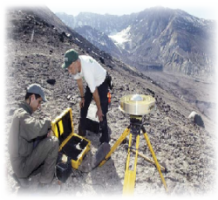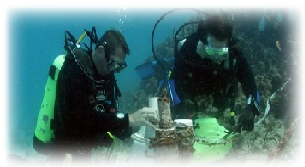Earth Science
The Earth Sciences are the focus of scientific understanding about this and other planets, embracing an enormous range of topics, including the evolution of the solar system, the earth, and life, the nature of planetary interiors, the causes of earthquakes and volcanic eruptions, earth-surface processes and the origin and behaviour of oceans and atmosphere. The emphasis of both our teaching and research is on understanding the fundamental principles of geological processes. Theory, measurements, experiments, and observation of natural processes are all essential elements in the Earth Sciences, and students with a strong background in all aspects of the physical sciences are encouraged to join the Department.
Earth Science is the study of the Earth and its neighbors in space. It is an exciting science with many interesting and practical applications. Some Earth scientists use their knowledge of the Earth to locate and develop energy and mineral resources.


Others study the impact of human activity on Earth's environment and design methods to protect the planet. Some use their knowledge about Earth processes such as volcanoes, earthquakes and hurricanes to plan communities that will not expose people to these dangerous events.
The Four Earth Sciences
Many different sciences are used to learn about the earth, however, the four basic areas of Earth science study are: geology, meteorology, oceanography and astronomy. A brief explanation of these sciences is provided below.
Geology: Science of the Earth
Geology is the primary Earth science. The word means "study of the Earth". Geology deals with the composition of Earth materials, Earth structures, and Earth processes. It is also concerned with the organisms of the planet and how the planet has changed over time. Geologists search for fuels and minerals, study natural hazards, and work to protect Earth's environment.
Meteorology: Science of the Atmosphere
Meteorology is the study of the atmosphere and how processes in the atmosphere determine Earth's weather and climate. Meteorology is a very practical science because everyone is concerned about the weather. How climate changes over time in response to the actions of people is a topic of urgent worldwide concern. The study of meteorology is of critical concern for protecting Earth's environment.


Oceanography: Science of the Oceans
Oceanography is the study of Earth's oceans - their composition, movement, organisms and processes. The oceans cover most of our planet and are important resources for food and other commodities. They are increasingly being used as an energy source. The oceans also have a major influence on the weather and changes in the oceans can drive or moderate climate change. Oceanographers work to develop the ocean as a resource and protect it from human impact. The goal is to utilize the oceans while minimizing the effects of our actions.
Astronomy: Science of the Universe
Astronomy is the study of the universe. Here are some examples of why studying space beyond Earth is important: the moon drives the ocean's tidal system, asteroid impacts have repeatedly devastated Earth's inhabitants and energy from the sun drives our weather and climates. A knowledge of astronomy is essential to understanding the Earth. Astronomers can also use a knowledge of Earth materials, processes and history to understand other planets - even those outside of our own solar system.

Today we live in a time when the Earth and its inhabitants face many challenges. Our climate is changing and that change is being caused by human activity. Earth scientists recognized this problem and will play a key role in efforts to resolve it. We are also challenged to:
develop new sources of energy that will have minimal impact on climate; locate new sources of metals and other mineral resources as known sources are depleted; and, determine how Earth's increasing population can live and avoid serious threats such as volcanic activity, earthquakes, landslides, floods and more. These are just a few of the problems where solutions depend upon a deep understanding of Earth science.